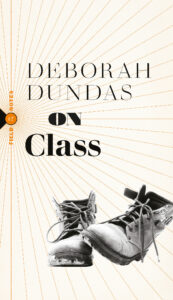
Toronto Star editor Deborah Dundas has the undeniable creds to write this book on growing up poor, and in doing so, she delves deep into exploring the ways in which we, as a society, talk – and think- about social and economic dignity.
Open about the tough circumstances she grew up in, “we moved fourteen times during my childhood, often to small brick buildings…gathered in clusters on main streets, tucked into residential neighbourhoods filled with post-war bungalows, near railroad tracks or strip malls, windows curtained with flags and tinfoil and old flowered sheets,” Dundas remembers going to the mall at the beginning of school to get exactly one outfit, knowing that this and a few clothes at Christmas were all I was likely to get the entire year.
“The latest Jordache jeans? I could only dream,” Dundas writes.
Dundas is not looking for sympathy as she discusses her journey through childhood and into adulthood – she is merely setting the stage on which to posit some hard questions, as well as some well-thought-out possible discussion points on the impacts of class.
While it is devastating to think that anyone is going hungry in a country as rich as Canada, or that families don’t have enough money to pay for the necessities of life, including warm clothes, a roof over their heads, effectively all the basic necessities of life – the emotional impacts of “the not having,” the “not being able to afford,” also need to be acknowledged and addressed.
When Dundas began her university studies she brought a briefcase to her first classes because she “wanted to look as if I belonged to the future I hoped for.”
And while envy for those in her class who were obviously rich would have been an understandable and normal reaction, Dundas says it was not their money she envied, but rather their confidence, their obvious aura of being a “part of” something that she inherently wasn’t.

I am sure that many of us who are privileged enough to be a part of the semi-well-heeled-middle-class have nevertheless had too-many-times-to-count situations where our weeks have extended far longer than the money we have allocated to get us through that week. But when the “not having, the not being able to afford,” is our way of life, the pressures and expectations of our friends and peers becomes a heavy burden to carry.
There are times when our friends, who have the money to spend on a night out, will do everything in their power to convince us to come out with them, but they really have no idea of the implications and impacts these nights out can have on our already “maxed to the hilt” credit cards.
“Playing the role that is expected of you can put you in harm’s way and make the hole you have to dig yourself out of even deeper,” Dundas says.
A writer and journalist, whose work has appeared in numerous publications in Canada, the UK and Ireland including Maclean’s, The Globe and Mail, The National Post, Canadian Notes and Queries, The Belfast Telegraph and The Sunday Independent, Dundas’ intent in writing “On Class” is to tell the authentic stories of ordinary people who are dealing with poverty as a means of profiling marginalized segments so that “policymakers understand lives they haven’t experienced themselves. We don’t get change – we get a reinforcement of a specific set of values. In this milieu where can change possibly come from?” Dundas asks. “What don’t we talk about when we don’t talk about class? And what might happen if, finally, we did?”
Join Jen Tindall, artyourservice.org, and Cece Scott, cecescott.com, as we chat with Deborah Dundas at this month’s Creative Aging Books & Ideas on
THURSDAY OCTOBER 26th, 2 p.m. EST
Click on the link below to register:
Subscribe to Cece’s newsletter updates for the latest in Book Reviews and Author Spotlights Here: so right here, right now.
Follow Cece at @cecemscott; on FB@ Cece Scott and email: cecemscott@gmail.com

